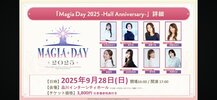Spotify link
https://open.spotify.com/album/2xLvMRMIL1KiDrHqkixN0n
https://x.com/natalie_mu/status/1918236562376278321
Kajiura interview on Natalie.mu
https://natalie.mu/music/pp/madoka-exedra01
Looks like its not just for Lighthouse but her music for the series in general. I like how she compares it to her music for Fate/Zero.
Its in general very interesting so dont miss it!
This is a really cool interview, and I like the way the interviewer took the questions and Kajiura’s responses.
Some (Google-translated) points I liked:
1. A bit about a perception of her music:
Interviewer: “A friend of mine is studying Noh, and he suddenly thought that Kajiura's music reminded him of the movements of a Noh performer."
Kajiura: “Ah, the center of gravity in Noh is low.” (she was previously talking about how she can't write free-spirited, light songs (specifically techno-pop) because her rhythmic and bass additions end up making the center of gravity of her songs lower than the initial melody.
2. Describing LINO LEIA
Kajiura: “Her voice is very pure and clear, but it's not really childish. It's a bit like an older sister, and no matter how you listen to it, it's not the voice of a junior high school student.”
Interviewer: "--What kind of interaction did you have with LEIA during recording?"
Kajiura: "LEIA tends to pronounce Japanese more slowly, and she hasn't sung up-tempo songs like "Lighthouse" much. She's a singer-songwriter, and it seems like she had a different feel to the songs she writes, so I think I talked to her about the pronunciation, bounce, and rhythm of songs like this one. But she's a talented person to begin with, and as you said, she's sung a lot of songs at live shows and on FictionJunction's albums, so she understood quickly and it didn't take that long. When I record songs, I usually ask for things like
"This word is important, so let's pronounce it so that it can be heard clearly," rather than focusing on technical matters, and I think it was the same this time.""
3. A peek into some of Kajiura's thought processes working with a vocalist (we can imagine this with some of the former vocalists and how they were guided to sing during studio recordings)
──What exactly do you mean by "this word"?
Kajiura: "First of all, the opening line, "Call my name." As I said before, the main character of the game is Namae-chan, so I purposefully started with "Call my name." It could be taken literally, but I wanted people to understand what "name" means when they play the game. The points where you shouldn't sing it smoothly are more common in the A and B verses, which are sung in a lower tone, than in the chorus, where you raise your voice. For example, the second A verse, "I'm alone, you're alone," and because I wanted each of these "alone" to be properly conveyed in words, I told her, "Think about the meaning of 'alone' twice in a row.""
--I'd love to hear more stories like that.
Kajiura: "Another example is when the noun following an adjective is a bit unexpected. For example, if you hear something like "cold fingertips," it will stick in your head, but if you hear something like "cold flames," it won't stick in your head unless you sing "flames" clearly. Humans hear an adjective and wait for the next noun to come, and the moment they hear the word "cold," they predict several possible nouns that will follow it. When a noun that isn't one of those candidates comes along, they miss it. That's why you have to pronounce those nouns clearly, otherwise the meaning of the unexpectedness will be lost. For example, in "Lighthouse," although it's not an adjective, I wanted the "soiled" and "sadness" in "Even the sadness that soiled my hands" to be sung clearly, so I said,
"Sing it as if you were acting, as if it were a line.""

